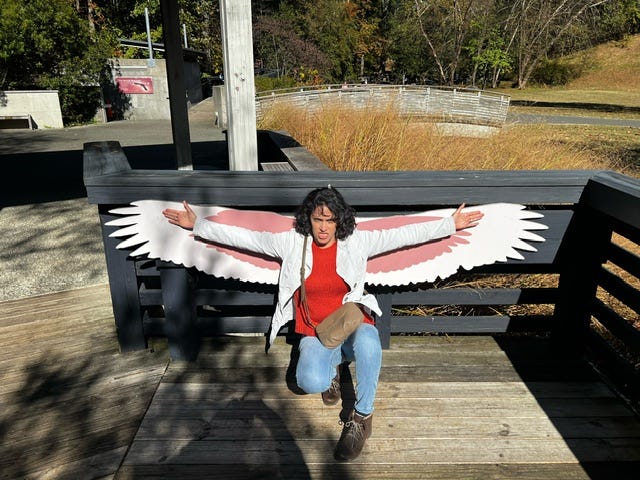You don't have to write every day to be a writer
And why we need to let go of strict expectations to be better artists
Last week, someone on my Threads feed proclaimed that if you don’t write every day then you’re not a writer. That was an easy unfollow.
Was that harsh? Impulsive? Overdramatic? I don’t believe so. I didn’t even know who the person was or why I followed them in the first place. All I knew was that anyone on my feed claiming to know better about what makes or doesn’t make a writer (someone whose name I’d never even heard of before) must be a charlatan, and I don’t have time for people bringing judgment and strict rules to how someone approaches their craft.
This topic of writing discipline tends to circulate a lot this time of year with writers all around the world diving into the now wildly popular NaNoWriMo. Fifty thousand words in thirty days or less. This is an average of 1667 words a day. Many writers thrive on this and more power to them. For others, myself included, a daily word count is an immediate curse upon our creativity.
I’ve attempted NaNoWriMo many times over the years. Of all those times, I was successful just once, meeting the fifty thousand-word goal, but I was so displeased with the result of the story that I started over from scratch. Perspective and positive thinking will tell me that my success came in forming the bones of the story, in figuring out what I didn’t like about it so that I could see with more clarity what I did like. But ever since restarting the story, I know that was probably the last time I’ll ever give NaNoWriMo a serious try again.
Even as a discovery writer, or pantser, the NaNoWriMo approach to just write every day—to put words down and not think too hard about technique, structure, motivations, etc.—didn’t work for me. The final result was a draft that was dry and emotionless. My characters were colorless caricatures—stick figures of the people I’d seen so vividly come alive in my mind.
These things are important to me. Yes, even while writing a crappy first draft. The fun of writing for me lies in playing with technique, symbolism, subtext, etc. as I work. If I can’t tap into the heart of the story when I start writing, then the story has no meaning to me. I need to feel my story more than I need to see it. I can come up with ten thousand scene ideas in a heartbeat, but if I can’t connect emotionally to the scene, then writing it is pointless to me.
At the start of summer, I gave up completely on this story. I worked on something else for some time—on and off and certainly not every day because my editing business was completely booked, so I squeezed writing in when I could and when my brain didn’t feel too fried from processing words all day. But at the start of fall, a vision for this old NaNoWriMo novel revisited me.
The tone had changed. The narrative voice came in clearly now, like when you finally manage to tune into a radio station that you could only hear through static noise before.
And I strongly believe—no, I know—that I couldn’t have achieved this if I hadn’t taken a long break from that story. I had to walk away from retracing the same steps over and over. I had to climb out of the trench and visit an entirely different view before I could return and see with fresh eyes what I needed to change.
While in this example I worked on something else during my break, I’ve had instances where I haven’t written for weeks or even months. I went through a long dry spell after my first attempt at a novel, approximately ten years ago (as my Saturn return kicked in and my quarter-life crisis invaded my brain space). I didn’t write for years as I tried to figure out what I wanted to do with my life, as I restructured my priorities and redefined my purpose.
This didn’t make me any less of a writer. I had twenty chapters of a novel in my hard drive, every single word in it chosen with care and passion. Unpublished, yes, and very much unfinished, but being a writer is about bringing ideas into the physical through the written word. It’s not about whether you’re a published author or not. It’s not about quantity or prestige. It’s not about accolades. It’s certainly not about word count or the consistency with which you pursue said word count. It’s about a feeling that persists and the noise in your head that comes alive when you communicate it through written language.
If you write one-word poems, you’re a writer. If you wrote one short story ten years ago and nothing since, you’re a writer. If your passion is pottery but you journal regularly, you’re a writer. If you only write in winter because it’s the only time of year when the world is quiet enough to concentrate, you’re a writer. If you wrote ten words for NaNoWriMo and called it a day on day two, you’re a writer. If you spend your life writing unpublished novels, still a writer.
Now, there are days when I’ll write entire chapters (these occur less often now as I’m more acutely aware of the passing of time and as I try to enjoy life rather than just giving in to the rat race). There are days when I feel like I’ve written over five thousand words, but I’ve actually barely cracked a thousand. There are days when I’ll write just one sentence, and I’ll feel proud of myself because at least I got something down. And then there are days when no words come at all, when I don’t even bother opening the document, when my brain says “Please, just The Great British Bake Off today and my favorite Squishmallow.”
Everyone’s writing approach is as different and as personal as their writing style and voice. Sometimes, they’re dependent on each other. So whether you find that NaNoWriMo is useful to you or not, whether you’re someone who writes every day or once a year, who loves sprints (I don’t) or takes a break after every sentence (I do), remember that there is only one correct way to approach the craft of writing: with your heart.
craft rec of the week
ShaelinWrites is my absolute favorite go-to for writing and literary tips. Most days, I watch their videos for fun while I’m on the treadmill. But whenever I’m confused about terminology, or even when I’m stuck on how to explain something to a client, I seek Shaelin for words of wisdom. They are a gold well of information. Clear, concise, brilliant. I just cannot hype their channel enough. If you want to learn more or just enjoy literary commentary, give them a watch.
small wins
In my mission to be more myself around people (as someone who hid her personality from the world her whole life due to crippling social anxiety), I’ve been pushing myself to do the goofy things in public that I wouldn’t have let myself do before for fear of judgment. Here I am measuring my wingspan against an eagle’s at a local animal center. My husband told me to look fierce as he took the picture, so this is my fierce face.
It’s not only a small win for me that I went for it in public, but also that I’m here sharing it with strangers on the internet now.
The bald eagle may have an amazing wingspan, but I’m owning my goofiness every day and losing the fear of being myself in front of everyone.
Did you have any small wins this week? Share in the comments! Look at my pic. Do I look like someone who’s in a position to judge? This is a safe space 100% of the time, and no win is ever too small!
Hi there, I’m Maria! I’m a freelance fiction editor assisting women writers in amplifying their voices through their writing. You can find me on Instagram @theintuitivedesk. Or visit my site
www. theintuitivedesk.com to find out more.
I’m also a writer currently working on too many novels at the same time. You can read some of my past writings here.
This newsletter is free, but if you would like to leave a tip, I would be grateful for your support.





